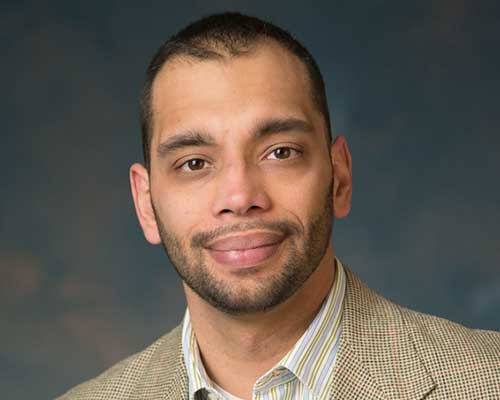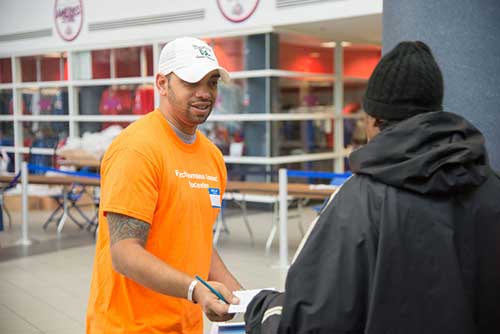Being all he can be for his military brothers and sisters
Jason “Jay” R. Rivera wanted to do more.
As a peer support specialist at the Canandaigua Veterans Affairs Medical Center’s Mental Health Residential Treatment Program, he has tried to help upstate New York veterans suffering from post-traumatic stress disorder, substance abuse, mental illness, and homelessness.
“As an 11-year U.S. Army veteran, it bothered me to see my fellow brothers and sisters in arms struggle so much during their transitions to civilian life from military life,” says Rivera, 34.
But he felt his role was limited. He realized he could provide a higher level of care as a social worker.
While working full-time at the VA, the father of two young daughters juggled a full-time load of coursework and fieldwork to complete his bachelor’s degree in social work, achieving a 3.9 grade point average (out of 4.0). He had taken general education courses while in the military, so as a transfer student, he was able to complete his bachelor’s degree in four semesters.
“Going to college full-time while working full-time and having a family has been the most difficult thing I have ever tried to accomplish,” says Rivera. He took some courses at night at Nazareth, worked Saturdays through Wednesdays, and did field placement on Thursdays and Fridays. “It shows you can do it, that it’s possible,” he says.
Flexible social work faculty helped. “The department will support you — they go above and beyond — but you have to put the work in.”
He added, “It definitely made me a lot stronger, knowing what I can do.”
Rivera’s commitment earned him a Rochester Area Colleges Continuing Education (RACCE) award. He went on for a master’s in social work.
Building on success
Rivera’s college work has built on his successes in the military, which was a stark turnaround from his teen years. He didn’t graduate from his Webster, N.Y., high school on time. He says didn’t attend regularly and didn’t apply himself.
In the Army, Rivera became a psychological operations specialist, tackling projects such as a mine risk education campaign in Zambia, where he worked directly with a U.S. ambassador and with foreign nationals. Other operations took him to Iraq, Afghanistan, Turkey, and Great Britain.
Rivera’s military experience demonstrated his ability to lead and organize, and he realized he had “a drive to do the right thing and make things happen.” He achieved the military rank of sergeant first class before he was forced to medically retire. He then worked in manufacturing, but he hated it.
“I like being around veterans,” says Rivera. “I know what they’re going through.”
Thanks to education benefits for veterans and Nazareth’s supplemental yellow ribbon program, Rivera hopes to complete his schooling without any debt.
The social work program has given him new insights and skills, so he feels well prepared to work in new ways with people in need. “It’s taught me a lot about human behavior and the problems people face in the world, why they face them, and what we can do to help them improve their quality of life.”
Rivera appreciates Nazareth’s strength-based approach: See people first as individuals, not as a diagnosis. Build on successes, rather than focusing on deficits.
His professors predict he will contribute well to the field. Annemarie House, LCSW-R, ACSW, a clinical associate professor of social work at Nazareth, says Rivera embraces the concept that the client is “the expert.”
“In his final paper for the Methods III class, he proposed an innovative evidence-based program where the military [Fort Bragg] could partner with the community to curb gang violence,” says House.
Rivera says Nazareth’s program is strong because of small classes and accessible faculty members who have expertise but are able to explain concepts in understandable ways.
“It’s the way they lecture. It’s the way they’re willing to see you outside of class. I’ve never had a problem getting ahold of them.”
His hands-on experience included helping with a Nazareth research project at Project Homeless Connect in Rochester. Rivera and other social work students helped Leanne Charlesworth, Ph.D., associate professor in social work, gather demographics about the attendees who showed up for meals, clothing, haircuts, and connections to medical, legal, and housing help.
Rivera might seek further education, such as a master’s in business administration, so that one day he could direct the VA behavioral health division—and accomplish even more.
—
Update:
- Thanks to veteran benefits, Rivera completed his master's degree without accumulating any debt.
- He moved into a social worker role at the U.S. Department of Veterans Affairs, Canandaigua.


Jason Rivera '15 taking part in Project Homeless Connect.